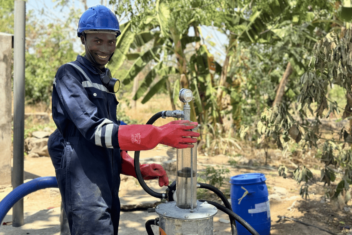Every drop counts | Innovations in greywater recycling

Water scarcity is a significant problem facing many parts of the world today. It is increasingly affecting people’s livelihoods, well-being and health. Access to and supply of water are likely to worsen due to the impacts of climate change. This demands immediate action.
- More than 40% of the world’s population currently live in water-stressed areas and the water demand is expected to rise by 55% over the next 30 years according to OECD.
- According to a joint progress report from WHO/UNICEF JMP, globally 1.8 billion people live without clean running water on their household premises. And in 7 out of 10 these households, women and girls aged 15 or older are primarily responsible for water collection. In this way, water scarcity is disproportionately impacting women.
With the global population only expected to rise in the coming years, it’s increasingly critical to find ways to conserve and reduce water consumption. And in a world where every drop counts, the journey from water scarcity to water security is one of paramount importance. With growing populations, changing climate, and increasing industrial and agricultural demands, the strain on our water resources has never been more acute. As articulated by Sareen Malik, co-chair of SWA at the Water Action Agenda Symposium:
“Climate change is a risk multiplier and water management is a resilience amplifier.”
However, in the face of this challenge, innovation has emerged as a beacon of hope, offering transformative solutions to safeguard our most precious resource.
Water security and innovation in greywater recycling
At the heart of this transformation lies the concept of greywater treatment and recycling. Once viewed as a last resort, recycling and reusing greywater have now become indispensable pillars of sustainable water management. Greywater is wastewater generated from domestic activities such as laundry, dishwashing, and bathing. Unlike blackwater, which contains fecal matter and is thus heavily contaminated, greywater is relatively clean and can be reused for irrigation, toilet flushing, and other non-potable purposes. Greywater, comprising 50% to 80% of household wastewater, contains potential contaminants necessitating proper management to mitigate health and environmental risks. Greywater recycling has emerged as a promising avenue, tapping into the potential of household wastewater to alleviate pressure on freshwater sources and research into greywater reuse has been linked to regional water security and vulnerability. Through simple, affordable, and innovative techniques, greywater can be reclaimed for non-potable uses, such as irrigation, flushing, and even industrial processes, thereby conserving freshwater for essential purposes.

Harnessing innovation
In response to this, one WASTE programme has been harnessing creativity and local expertise. Each year the FINISH Mondial Hackathons help to develop and nurture groundbreaking technologies for a more sustainable future.
Water scarcity was central to this year’s hackathon theme of: “Greywater Recycling for Sustainable Agriculture and Kitchen Gardening” which focused on promoting technological innovation for treating and recycling greywater from households to support sustainable agriculture and kitchen gardening. This year’s event was the fourth instalment of the hackathon and covered four critical focus areas: a) Grey Water Treatment Technologies; b) Smart Irrigation Systems; c) Sensor and Monitoring Solutions; and d) Community Engagement and Education.
FINISH Mondial’s 4th hackathon received 77 applications from 28 countries, of which 8 innovations were presented at the Winners’ Announcement on the occasion of World Water Day 2024. The impact of these innovations extends beyond technological prowess alone. They embody a collective commitment to sustainability and resilience, transcending borders, and boundaries in pursuit of a common goal.
“The endorsement and approval of this group of international experts is indeed overwhelming. With this award, we would like to scale this innovation to a per capita level, just like our name suggests. Thank you for really believing in us.” – Avinash Kumar, Founder at Hashtag Percapita, Winners of 2024 Hackathon whose winning innovative solution you can see below.

Recognising the significance of such endeavours, initiatives to honour and celebrate innovation in water management have gained traction worldwide. From prestigious awards to dedicated platforms for knowledge sharing, these efforts not only acknowledge the ingenuity of individuals and organisations but also inspire future generations to continue pushing the boundaries of possibility. This effort was to support the finalists reach a wider audience and other like-minded organisations that could potentially collaborate and even support such innovations committed to sustainability.
As we navigate the dynamic challenges of water scarcity and security, one thing remains clear: our ability to innovate will help determine our success in safeguarding this invaluable resource. We must also address other critical aspects, such as consumption patterns, proper allocation of agricultural water demands, maintaining water quality, and securing sufficient and appropriate funding. Furthermore, it is essential to strengthen the enabling environment—governance, policies, political frameworks, and other supporting measures to close the substantial funding gap and meet these urgent needs.
Innovation in water management isn’t just about developing new technologies; it’s about fostering collaboration, building resilience, and adapting to change.
See innovation in action and be inspired by watching video pitches from this year’s Hackathon finalists and the winner’s announcement at the Hackathon 2024 playlist.
By Kartik Kamath, WASTE consultant on Implementation of Innovative Technologies and this year’s Hackathon Coordinator


